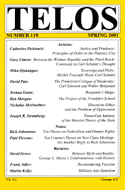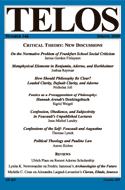Each Tuesday in the TELOSscope blog, we reach back into the archives and highlight an article whose critical insights continue to illuminate our thinking and challenge our assumptions. Today, Philip Crone looks two articles about the Frankfurt School: Ben Morgan’s “The Project of the Frankfurt School,” from Telos 119 (Spring 2001), and James Gordon Finlayson’s “Morality and Critical Theory: On the Normative Problem of Frankfurt School Social Criticisms,”from Telos 146 (Spring 2009).
In an earlier post on the TELOSscope blog, Nicole Burgoyne highlighted a 2001 interview with Paul Piccone in which he discussed the appearance of Telos in the 1960s. Piccone listed a number of ideological currents that played major formative roles in the early years of Telos, including Frankfurt School critical theory. Forty years after the first issue of Telos was published the journal is still going strong, but can the same be said of the critical theory of the Frankfurt School? The Frankfurt School itself long predates Telos; the beginnings of its program can be traced to the 1920s when the Institute for Social Research was founded by Carl Grünberg. The Frankfurt School, or at least what is known as its “first generation,” reached its apex with the publication of the second edition of Max Horkheimer and Theodor Adorno’s Dialectic of Enlightenment in 1947. While thinkers influenced by this first generation continue to exert enormous intellectual influence, the ideas of the original group itself have waned.
 Dialectic of Enlightenment is now viewed primarily has a “historical document” rather than a “theoretical treatise” with contemporary applications, or so argues Ben Morgan in “The Project of the Frankfurt School.” Morgan does not disagree with a historical reading of the text, but he also does not discount the possibility of reworking the arguments of Horkheimer and Adorno for a more contemporary setting. Other thinkers have done as much. As Morgan points out, Frederic Jameson, Jürgen Habermas, Albrecht Wellmer, and Terry Eagleton have all reformulated the Frankfurt School notion of “mimesis” as part of their own work. Yet “[a]ll these re-workings of the term minimize its psychological and emotional content,” and Morgan seeks to contemporize the project of the Frankfurt School while retaining the psychological import of “mimesis.” He begins by explaining what Horkheimer and Adorno mean by the term:
Dialectic of Enlightenment is now viewed primarily has a “historical document” rather than a “theoretical treatise” with contemporary applications, or so argues Ben Morgan in “The Project of the Frankfurt School.” Morgan does not disagree with a historical reading of the text, but he also does not discount the possibility of reworking the arguments of Horkheimer and Adorno for a more contemporary setting. Other thinkers have done as much. As Morgan points out, Frederic Jameson, Jürgen Habermas, Albrecht Wellmer, and Terry Eagleton have all reformulated the Frankfurt School notion of “mimesis” as part of their own work. Yet “[a]ll these re-workings of the term minimize its psychological and emotional content,” and Morgan seeks to contemporize the project of the Frankfurt School while retaining the psychological import of “mimesis.” He begins by explaining what Horkheimer and Adorno mean by the term:
. . . a world in which people are not only connected to or part of nature (an idea which is hardly controversial), but can directly experience this connection. The term Horkheimer and Adorno use to describe this experience is “mimesis.” In using this term, they do not mean the forms of aesthetic representation Erich Auerbach discussed in his book of the same name. They invoke something closer to the biological use of the term—animal or gut reactions such as freezing to blend with nature when a predator is near, or the imitative practices whereby the shaman becomes like the environment he wishes to influence.
The psychological content of the term is clear from this definition, and yet it remains Morgan’s task to preserve this psychological content while pushing the project of the Frankfurt School forward into more modern contexts. He attempts this by focusing on the psychoanalytic work of Donald Winnicott, work that encapsulates mimesis as an infantile “female state.” This work can provides justification for mimesis in “empirically grounded psychoanalysis.” Morgan argues that this type of psychoanalysis can serve as the starting point for a continuation of the Frankfurt School project, particularly for the advancement of the study of mimesis from a psychological perspective.
 One problem that Morgan does not confront, but which could pose a problem for further articulations of Frankfurt School critical theory is what James Gordon Finlayson calls the “original criticism” of Horkheimer and Adorno. In “Morality and Critical Theory: On the Normative Problem of Frankfurt School Social Criticisms,” Finlayson presents the problem as articulated by Habermas: “From the beginning, critical theory labored over the difficulty of giving an account of its own normative foundations. . . .” Finlayson argues that any critical theory of society must make claims as to what is wrong with society, and thus must have normative or moral conclusions. Furthermore, any theory with moral conclusions must have some moral foundations to justify those conclusions. This does not pose a problem for some social and political theorists, including those working in analytic philosophy, but it does pose a significant problem for the Frankfurt School since
One problem that Morgan does not confront, but which could pose a problem for further articulations of Frankfurt School critical theory is what James Gordon Finlayson calls the “original criticism” of Horkheimer and Adorno. In “Morality and Critical Theory: On the Normative Problem of Frankfurt School Social Criticisms,” Finlayson presents the problem as articulated by Habermas: “From the beginning, critical theory labored over the difficulty of giving an account of its own normative foundations. . . .” Finlayson argues that any critical theory of society must make claims as to what is wrong with society, and thus must have normative or moral conclusions. Furthermore, any theory with moral conclusions must have some moral foundations to justify those conclusions. This does not pose a problem for some social and political theorists, including those working in analytic philosophy, but it does pose a significant problem for the Frankfurt School since
Critical theory does not, and in some respects had better not, avail itself of any broadly moral standard (be this a conception of good, bad, right, or wrong). . . . Either it [critical theory] relies on broadly moral premises (or broadly moral considerations) and is therefore self-contradictory, or it does not, in which case its conclusions are unsupported.
Frankfurt School critical theory eschews broadly moral standards that could justify its conclusions for good reasons. In large part as a response to the Third Reich, critical theorists saw morality itself as having failed to prevent atrocities. Furthermore, they adopted Marxist and Hegelian interpretations that saw morality as a way to legitimate class interests. These characteristics of the theory are in many ways integral to its uniqueness, and thus it remains hard to see how they can be overcome. Finlayson concludes that critical theory is committed to unsupported conclusions. He takes this conclusion as inadequate and points toward resolutions of it, particularly in the work of Habermas and communicative ethics. Still, he does not reach any final conclusions about how to resolve this normative problem of the Frankfurt School.
Together, Finlayson and Morgan provide sketches of what needs be done to contemporize Frankfurt School critical theory while maintaining some of the critical elements of its first generation. Perhaps such a reworking of the Frankfurt School, were it to move forward, would inform the direction of Telos today much as the first generation of the Frankfurt School informed the journal in its early years.
Read the full version of Ben Morgan’s “The Project of the Frankfurt School” and James Gordon Finlayson’s “Morality and Critical Theory: On the Normative Problem of Frankfurt School Social Criticisms” at the TELOS Online website. If you are affiliated with an institution that is an online subscriber to Telos, you have free access to our complete online archive. If not, you can purchase 24-hour access to this and other Telos articles at the low rate of $5/article.



